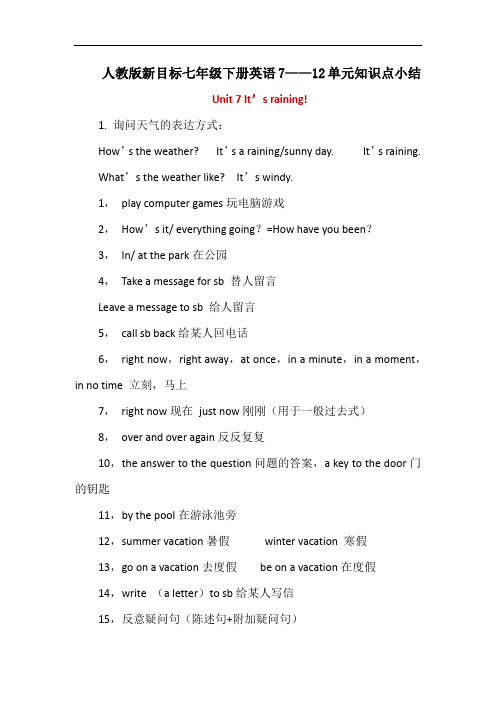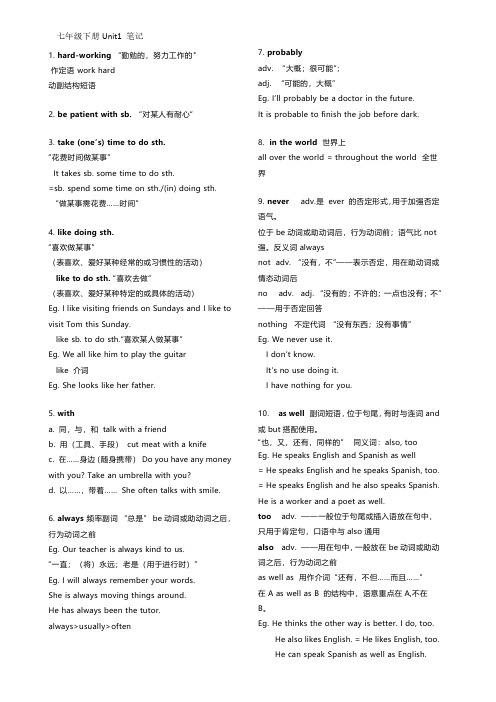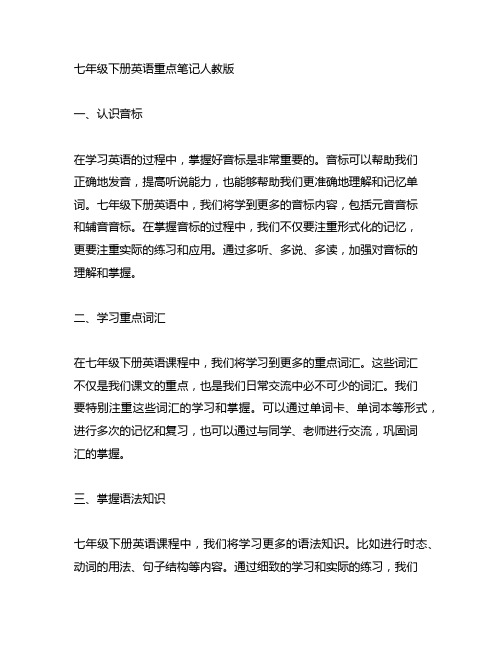人教版新目标英语七年级下册笔记
- 格式:doc
- 大小:203.00 KB
- 文档页数:5


人教版新目标七年级下册英语7——12单元知识点小结Unit 7 It’s raining!1. 询问天气的表达方式:How’s the weather? It’s a raining/sunny day. It’s raining.What’s the weather like? It’s windy.1,play computer games玩电脑游戏2,How’s it/ everything going?=How have you been?3,In/ at the park在公园4,Take a message for sb 替人留言Leave a message to sb 给人留言5,call sb back给某人回电话6,right now,right away,at once,in a minute,in a moment,in no time 立刻,马上7,right now现在just now刚刚(用于一般过去式)8,over and over again反反复复10,the answer to the question问题的答案,a key to the door门的钥匙11,by the pool在游泳池旁12,summer vacation暑假winter vacation 寒假13,go on a vacation去度假be on a vacation在度假14,write (a letter)to sb给某人写信15,反意疑问句(陈述句+附加疑问句)反意疑问句中,陈述句用的肯定,后面的附加疑问句就要用否定;相反,陈述句用的否定,附加疑问句就要用肯定。
16,adj 以-ing结尾“令人…的”,主语是事物,或者修饰事物exciting,interesting,relaxing以-ed结尾“人感到…的”主语是人,excited,interested,relaxed 17,in the first picture在第一张照片里18,dry干燥的humid潮湿的人教版新目标英语七年级下册Unit 8 Is there a post office near here?1,There is +单数可数名词/不可数名词+ 地点状语. There are +复数名词+地点状语. 谓语动词要与跟它最近的那个名词一致(就近原则)。


1.hard-working“勤勉的,努力工作的"作定语work hard动副结构短语2.be patient with sb.“对某人有耐心“3.take(one’s)time to do sth.“花费时间做某事”It takes sb.some time to do sth.=sb.spend some time on sth./(in)doing sth.“做某事需花费……时间”4.like doing sth.“喜欢做某事”(表喜欢、爱好某种经常的或习惯性的活动)like to do sth.“喜欢去做”(表喜欢、爱好某种特定的或具体的活动)Eg.I like visiting friends on Sundays and I like to visit Tom this Sunday.like sb.to do sth.“喜欢某人做某事”Eg.We all like him to play the guitarlike介词Eg.She looks like her father.5.witha.同,与,和talk with a friendb.用(工具、手段)cut meat with a knifec.在……身边(随身携带)Do you have any money with you?Take an umbrella with you?d.以……,带着……She often talks with smile.6.always频率副词“总是”be动词或助动词之后,行为动词之前Eg.Our teacher is always kind to us.“一直;(将)永远;老是(用于进行时)”Eg.I will always remember your words.She is always moving things around.He has always been the tutor.always>usually>often 7.probablyadv.“大概;很可能”;adj.“可能的,大概”Eg.I’ll probably be a doctor in the future.It is probable to finish the job before dark.8.in the world世界上all over the world=throughout the world全世界9.never adv.是ever的否定形式,用于加强否定语气。

2012版人教新目标七年级英语下册课堂笔记1. rain v. 下雨n. 雨水It’s raining hard outside.heavy rain暴雨,大雨rain cats and dogs下倾盆大雨rainy下雨的; 多雨的It’s windy today.wind风It’s cloudy today.cloud云4. sunny adj. 晴朗的It’s sunny today.近:clear晴朗的sun太阳5. snow v. 下雪n. 雪Put on your coat. It’s snowing.We can see a lot of snow in the street.snowy下雪的,多雪的6. weather n.天气同音:whether是否What’s the weather like today?7. cook v. 做饭She often cooks dinner for us.cookn. 厨师cooker炊具cooking烹饪8. bad adj. 坏的;糟的Watching too much TV is bad for our eyes.反:goodbadly非常;很;恶劣地9. park n. 公园There are a lot of people in the park.parkn. 停车场v. 停车garden花园10. message n. 信息;消息Could I leave a message?take a message捎个口信;传话11. him pron. 他I want to see him.he他his他的himself他自己12. could modal v. 能;可以Could I use the computer?近:can否定:couldn’t= could notcould 的语气比can委婉13. back adv. 回来;回原处Please put this book back.I have to go back home late.come back回来give back归还call back回电话back后背14. problem n. 困难;难题Let me know if you have any problems.solve the problem解决问题no problem没问题;没关系15. again adv.再一次;又一次again and again再三地;反复地Let’s look at the example again.1. dry adj. 干燥的It’s dry here in autumn.反:wet湿的dry使干燥;把……弄干dryer烘干机;干燥剂2. cold adj. 寒冷的;冷的Isn’t it cold today?反:warm温暖的coldv. 寒冷;感冒adj. 冷淡的3. hot adj. 热的I’d like some hot water.反:cold寒冷的hot辣的;热情的4. warm adj. 温暖的My room is very warm in winter.反:cool凉爽的warm热情的;友好的;保暖的5. visit v. 参观;拜访Can I visit you this Sunday?Today, many people visit Chinatown.visitn. 参观;拜访visitor访问者;参观者6. Canada n. 加拿大Her parents live in Canada.Canadiann. 加拿大人adj. 加拿大(人)的7. summer n. 夏天;夏季Do you like summer or winter?in summer在夏天8. sit v. 坐Don’t sit on the floor.反:stand站sit down坐下seat座位9. juice n.果汁;饮料不可数名词orange juice10. soon adv. 不久;很快Stop smoking, and you will get better soon.as soon as possible尽快11. vacation n. 假期summer vacation近:holiday假期on (a) vacation在度假go on a vacation去度假12. hard adv. 努力地adj. 困难的She works hard at her subjects.This problem is too hard.近:difficult困难的work hard努力工作hard work困难的工作13. Europe n. 欧洲He wants to travel around Europe.Europeanadj. 欧洲(人)的n. 欧洲人14. mountain n. 高山The mountain is 2000 meters high.近:hill小山;丘陵15. country n. 国;国家They come from different countries.复:countriescountry乡村16. skate v. 滑冰He is learning how to skate.go skating去滑冰skater溜冰者skating滑冰;溜冰17. snowy adj. 下雪的I like snowy days.snown. 雪v. 下雪18. winter n. 冬季;冬天When winter arrives, there are no leaves on trees.spring春天autumn秋天summer夏天19. Russian adj. 俄罗斯的n. 俄罗斯人;俄语Russian. 俄罗斯I want a Russian salad.That young man is Russian.My grandfather can speak a little Russian.20. snowman n. 雪人He made a snowman just now.复:snowmenmake a snowman堆雪人21. rainy adj. 阴雨的,多雨的I don’t like rainy days.rainn. 雨水v. 下雨1. --How’s the weather in Shanghai?--It’s cloudy.--上海的天气怎么样?--多云。

七年级下册英语重点笔记人教版一、认识音标在学习英语的过程中,掌握好音标是非常重要的。
音标可以帮助我们正确地发音,提高听说能力,也能够帮助我们更准确地理解和记忆单词。
七年级下册英语中,我们将学到更多的音标内容,包括元音音标和辅音音标。
在掌握音标的过程中,我们不仅要注重形式化的记忆,更要注重实际的练习和应用。
通过多听、多说、多读,加强对音标的理解和掌握。
二、学习重点词汇在七年级下册英语课程中,我们将学习到更多的重点词汇。
这些词汇不仅是我们课文的重点,也是我们日常交流中必不可少的词汇。
我们要特别注重这些词汇的学习和掌握。
可以通过单词卡、单词本等形式,进行多次的记忆和复习,也可以通过与同学、老师进行交流,巩固词汇的掌握。
三、掌握语法知识七年级下册英语课程中,我们将学习更多的语法知识。
比如进行时态、动词的用法、句子结构等内容。
通过细致的学习和实际的练习,我们能够更好地掌握这些语法知识,提高自己的写作和表达能力。
我们要注重语法知识的灵活运用,可以通过写作、口语练习等形式,提高语法知识的应用能力。
四、阅读理解能力在七年级下册英语课程中,我们将接触到更多的阅读材料。
这些材料不仅包括课文内容,还包括一些阅读理解题目。
通过阅读的过程,我们能够了解更多的知识,提高自己的阅读理解能力。
在阅读理解过程中,我们要注重细节的把握,提高对文章整体的理解能力。
可以通过大量的阅读练习,积累更多的阅读经验,提高自己的阅读速度和理解能力。
五、写作能力的提高在七年级下册英语课程中,我们将学习更多的写作知识。
我们不仅要学会写句子、段落,还要学会写作文。
通过写作的过程,我们可以提高自己的语言表达能力,增强自己的思维能力。
在写作的过程中,我们要注重语言的丰富性和表达的准确性,通过多次的修改和润色,提高自己的写作水平。
总结回顾:在七年级下册英语课程中,我们学习了更多的知识,提高了自己的英语能力。
通过掌握音标、学习重点词汇、掌握语法知识、提高阅读理解能力和写作能力的提高,我们不仅能够更好地掌握英语知识,也能够提高自己的英语能力。
七年级英语下册(人教版)全册笔记-超详细Unit 1 Can you play the guitar?划划重重点必背句型:1.let‘s go, shall we ?我们一起去,好吗?2.let us go , will you ? 让我们去,好吗/3.What club do you want to join ? 你想参加什么俱乐部?4.I want to join a sports club. 我想参加体育俱乐部。
5.What do you want to do ? 你想干什么?6.I want to play basketball . 我想踢足球。
7.What can you do ? I can play the guitar .8.Can he do Chinese kung fu ?Yes, I can . / No ,I can‘t .9.guitar 为一种乐器,play the guitar 西洋乐器名词前要加定冠词the。
球类运动、棋类、三餐、四季不用定冠词the10.join 意为―参加团体、组织(成为其成员)‖join in=take part in―参加活动、比赛|‖11.go swimming去游泳go+doing 去做某事12.注意区分:speak, say, talk和tell①say 说话What can you say?②speak+语言③talk表示两个人或多个人在一起讲话、谈论(多指随意谈论)talk with sb 与某人交谈talk to sb 向某人说…talk about 谈论…。
④tell 的意思是―告诉,讲述,吩咐‖,讲故事或讲笑话多用tell。
13.Show ―表演,演出,出示……给某人看‖,show sth. to sb.=show sb. sth.。
14.show 作名词,意为―展览,展出‖on show ―在展出‖car show 车展。
人教版七年级英语下课堂笔记Unit1一、重点短语1. at the old people's home在敬老院2. be good at singing 善于唱歌3. be good at swimming 善于游泳4.be good at dancing 跳舞5. be good with old people与老人相处得好6. be in our school music festival参加我们学校的音乐节7 come and show us来给我们展示一下8. come to the Students' Sports Center来学生运动中心9. do Chinese kung fu表演中国功夫10.English-speaking students说英语的学生11. help with sports在运动方面提供帮助12. in the music room在音乐室13. in the school music club在校音乐俱乐部14. in the school show在学校汇演中15.join the swimming club加入游泳俱乐部16.like drawing/like to draw喜欢画画17. make friends with sb. 和某人交朋友18. musicians wanted 招聘音乐家19. need help to teach music需要帮助去教音乐20. on the weekend/on weekends(在)周末21 play chess下国际象棋22. play games with people与人玩游戏23. play the drums敲鼓"24. play the guitar弹吉他25. play the piano 弹钢琴26. play the violin 拉小提琴"27. students wanted for the school show为学校演出招募学生28. tell stories讲故事29. the story telling club讲故事俱乐部30. talk with sb. about sth. 和某人谈论某事二、重点句型1.—Can you play the guitar or the violin?你会弹吉他还是拉小提琴?—I can play the guitar.我会弹吉他。
Unit 12 What did you do last weekend?2012版人教新目标七年级英语下册课堂笔记1. camp v. 扎营;搭帐蓬Where did you camp last night?go camping去野营camp out野营;露营campn.营地;阵营2. lake n. 湖;湖泊There is no fish in this lake.on the lake在湖面上in the lake在湖里3. beach n. 海滩;沙滩They walked along the beach.复:beacheson the beach在海滩上4. sheep n. 绵羊;羊复:sheep There are 3 sheep eating grass under the tree.5. as prep.作为,当作as像……一样As a student, you should study hard.6. natural adj. 自然的My mother uses natural gas to cook meals.naturaladj.天生的7. visitor n. 游客;访问者近:touristn.旅游者;游客She is showing some visitors around our school.8. tired adj. 疲劳的;疲倦的He looks tired today.近:tiringadj.累人的be tired of对……厌烦tiredadj.厌烦的;厌倦的9. stay v. 停留;待Please stay at home.反:leavev.离开stay up熬夜stayn.停留;逗留v.保持10. away adv. 离开;远离People began to move away.run away跑开go away走开awayadv.在远处11. mouse n. 老鼠;耗子I saw 2 mice in the kitchen.复:micemousen.鼠标;胆上如鼠的人12. baby adj. 幼小的;婴儿The baby deer can stand up now.复:babies13. shout v. 呼叫;喊叫You shouldn’t shout at old people.shout at冲……大声叫嚷14. language n.语言They learn the language through songs and games.foreign language外语body language肢体语言mother language母语1. fly v. 飞The little bird still can’t fly.fly away飞走flyn.苍蝇2. kiteThat kite looks like a butterfly.fly a kite放风筝3. high adj. & adv. 高的(地)There is a high mountain at the back of the house.My kite can fly high in the sky.近:tall反:lowhigh school中学height高度4. ago adv. 以前He left here 3 days ago.近:beforelong time ago很久以前5. India n. 印度He lives in India with his mother.Indianadj.印度的,印度人6. tentPeople sleep in tents when they go camping.put up a tent搭帐篷tentv.住帐篷7. moon n. 月亮There is no water or air on the moon.full moon满月8. surprise n. 惊奇;惊讶v. 使吃惊He looked at me in surprise.The news surprised me.in surprise惊奇地to one’s surprise使某人吃惊的是get a surprise吃惊surprisedadj.感到惊讶的surprisingadj.令人惊讶的9. snake n. 蛇There is a snake in the grass.10. scared adj. 惊慌的; 吓坏了的。
Unit 2 What time do you go to school?2012版人教新目标七年级英语下册课堂笔记1. upadv. 向上n 反义词:down nget up起床nstand up起立Please lift your head up.2. dress v. 穿衣服n. 连衣裙n复数:dressesn get dressed穿上衣服My daughter is too young to dress herself.3. brush v. 刷;刷净n. 刷子n 复数:brushes n 单三: brushes nwipe擦nsweep扫nrub摩擦nscrape刮掉You have to brush your shoes now.4. toothn. 牙齿n 复:teeth nbrush teeth刷牙ntoothpick牙签ntoothpaste牙膏ntoothbrush牙刷The baby has two teeth.常见的可数名词单数变复数时不规则变化的名词有: man, woman, child, foot, mouse, tooth 等。
我们可以用这样一句话来记忆这些单词“男女孩子的脚踩住老鼠的牙”5. shower n. & v. 淋浴,(名)淋浴器n 近: bath 洗澡,沐浴ntake/have a shower洗澡nshower下阵雨,倾注;阵雨,大量倾泻nshow给……看You’d better take a shower.6. usually adv. 通常地,一般地Do you usually go to the park?n unusually异乎寻常地7. fortynum. 四十n 表示“几十”的数字都以-ty结尾。
n词形特殊的有:twenty, thirty, forty, fifty, eighty.nfour四nfourteen十四There are 40 students in Class One.8. never adv. 从不; 绝不n Better late than never.迟做总比不做好。